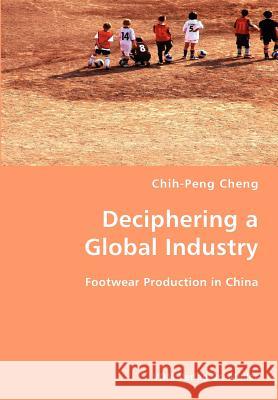Deciphering a Global Industry » książka
Deciphering a Global Industry
ISBN-13: 9783836417723 / Angielski / Miękka / 2007 / 256 str.
The book examines the formation and transformation of the Chinese exportled footwear industry from a political-economic perspective. In particular, it explains why Taiwanese businessmen succeeded in developing the industry while Nike, the largest shoe producer in the word, failed. Several theories are explored, rooted in neoclassical economic, new institutional economics, new institutional sociology, and new economic sociology, to explain why the Taiwanese but not Nike succeeded in China. But these explanatory models are all found wanting. Instead, the thesis demonstrates that a model of markets as politics and fields, one that emphasizes the role of power, best accounts for the origin, evolution, and transformation of the Chinese exportled footwear industry. A stable status hierarchy, comprised of Taiwanese footwear producers, local officials, and migrant laborers, created a business environment that solved uncertainties embedded in the Chinese economic transition. The Taiwanese producers and local officials were less powerful than large firms and the state, despite being deeply involved in the Chinese economic "miracle," but by developing alliances with local political officials, Taiwanese business, with local political support, transformed China into the leading footwear producer in the world. However, tensions rooted in the Chinese economy, polity, and society are shown to make the future of the country's domination of global production uncertain. The book is addressed to scholars and students in Sociology, Politics, and Economics. It is also directed towards managers who are interested in investing in China. Susan Eckstein (Boston University) said: "There is no business like shoe business, and Chih-Peng Cheng most informatively explains why. He fascinatingly details how the shoe industry goes global and how and why the Taiwanese dominate it, first in their own country but more recently in China. Nike had much to learn from them."
The book examines the formation and transformation of the Chinese exportledfootwear industry from a political-economic perspective. In particular, itexplains why Taiwanese businessmen succeeded in developing the industrywhile Nike, the largest shoe producer in the word, failed. Several theories areexplored, rooted in neoclassical economic, new institutional economics, newinstitutional sociology, and new economic sociology, to explain why theTaiwanese but not Nike succeeded in China. But these explanatory modelsare all found wanting. Instead, the thesis demonstrates that a model ofmarkets as politics and fields, one that emphasizes the role of power, bestaccounts for the origin, evolution, and transformation of the Chinese exportledfootwear industry. A stable status hierarchy, comprised of Taiwanesefootwear producers, local officials, and migrant laborers, created a businessenvironment that solved uncertainties embedded in the Chinese economictransition. The Taiwanese producers and local officials were less powerfulthan large firms and the state, despite being deeply involved in the Chineseeconomic "miracle," but by developing alliances with local political officials,Taiwanese business, with local political support, transformed China into theleading footwear producer in the world. However, tensions rooted in theChinese economy, polity, and society are shown to make the future of thecountrys domination of global production uncertain. The book is addressedto scholars and students in Sociology, Politics, and Economics. It is alsodirected towards managers who are interested in investing in China.Susan Eckstein (Boston University) said: "There is no business like shoebusiness, and Chih-Peng Cheng most informatively explains why. Hefascinatingly details how the shoe industry goes global and how and why theTaiwanese dominate it, first in their own country but more recently in China.Nike had much to learn from them."











